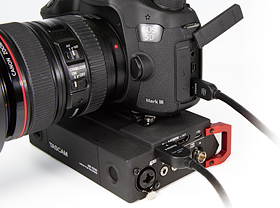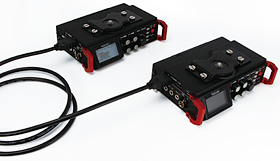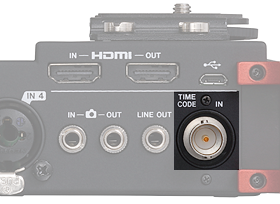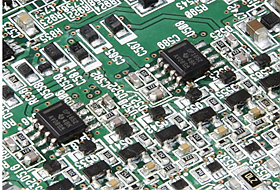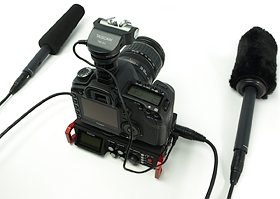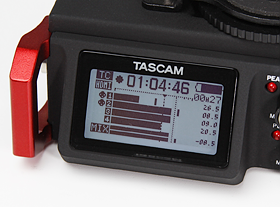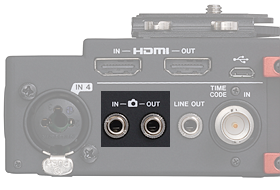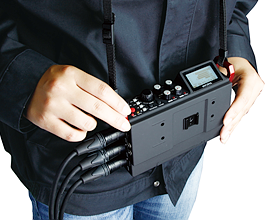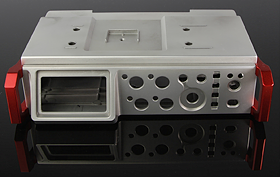Tascam DR-701D
The Tascam DR-701D is Tascam’s flagship audio recorder for one-shot video production. It includes a timecode input and a timecode generator for easy synchronization with a SMPTE generator, camera, or smart slate. The HDMI in and out allows a DSLR camera to start recording on both devices, and video clock prevents drift between sound and picture.
Four mic signals can be individually recorded and mixed to a stereo channel, for a total of six recording channels. For additional channels, multiple units can be cascaded together. The lightweight yet rigid chassis is forged from magnesium alloy. Tripod mounts on the top and bottom allow the unit to mount under a camera, attach to a follow-focus cage, or be used stand-alone.
Designed for the needs of professional filmmakers, television producers, advertisers, and documentarians, the DR-701D packs high-quality multitrack recording into a package compact enough for use with any camera.
Synchronization functions for demanding projects
Perfect camera sync using HDMI video clock synchronization
An HDMI input and output allows the DR-701D's internal clock and the camera to be digitally synchronized. Even when shooting long events, the video files recorded by the camera and audio files recorded by the DR-701D will not drift out of sync.
One button press on the camera starts sound recording on the DR-701D
Simply pressing the camera recording start button sends a trigger to the DR-701D to start audio recording. Unlike other systems that force you to press record on both devices, the HDMI start system prevents missed takes, syncs the two recording starts together, and makes single-operator shoots much easier.
Note: This feature is dependant on camera firmware, see compatibility chart below.
Cascade feature for additional track recording
By connecting multiple units using HDMI, slave DR-701D units can be made to follow a master unit to start and stop recording simultaneously. Since audio can also be output through the HDMI connection, monitoring selections can be made using slave units without reconnecting headphones.
SMPTE timecode stores time data in recorded audio files
The built-in SMPTE generator allows the camera and DR-701D to store the same time reference. Several options are available to integrate SMPTE LTC into your camera system. The BNC timecode input can follow a source signal, or can be "jam-synced" a few times per day for independant freewheel operation. Cameras that send timecode through their HDMI output can be followed by the DR-701D's timecode input. And the internal generator can be started without an external reference for a simple time-of-day stamp on recorded BWF files.
Record up to six channels at pristine audio quality
Six-channel recording (four channels + L-R stereo mix)
Using the built-in mixer with four inputs and two outputs, four audio channels and their L-R stereo mix (six channels total) can be recorded simultaneously. In addition to pan and level adjustments, the mixer also includes a delay function that can compensate for distances between mics. A mid-side decoding function is also built in for use with mid-side stereo microphone setups.
High audio quality through HDDA microphone preamps
The mic preamps that amplify the audio output from microphones have a significant impact on the quality of the recorded audio. The DR-701D features TASCAM HDDA mic preamps. The differential mic preamp circuits use discrete architecture and are made with carefully selected components. For example, op amps have a great impact on audio quality, so the OPA1652 by Texas Instruments was selected, which has even higher quality and lower noise than those used in the previous DR-70D model. As a result, the unit boasts an equivalent input noise of -124 dBu or better.
The A/D converters, which convert analogue signals to digital, are made by Asahi Kasei Corporation and are equivalent to those used in the top models in the TASCAM DR series of linear PCM recorders. High audio quality HDDA circuits faithfully convert amplified audio to digital. Resolutions up to 96 kHz/24-bit are supported when recording six channels and 192 kHz/24-bit when recording two channels.
Four XLR/TRS combo jacks allow a wide range of setups
The DR-701D has four XLR/TRS inputs. The ability to adjust input levels independently and the availability of four channels make it possible to do separate miking of ambience and individual sound sources by utilizing two shotgun mics and one stereo mic. Since a 3.5-mm stereo input can be selected for channels 1-2 and the built-in omni mics for channels 3-4, an even wider range of mic setups are possible.
Multiband limiter and five-stage low-cut filter
A limiter function that automatically adjusts excessive input levels is included for all four inputs. A more natural sound quality is achieved because a multiband limiter is employed to affect only the frequency ranges that have excessive input. In addition, a five-stage low-cut filter can be adjusted to cut wind noise, rumble and other undesirable low frequencies.
Dual-recording function
Safety files can be created by recording two audio files simultaneously at different levels in case the main recording clips due to unexpected input overloading.
Special features for use with DSLR cameras
Record the same audio with a DR-701D and your camera
A dedicated connector is included to output mixed audio to the DSLR or video camera. This way, the same audio can be recorded by both the DR-701D and the camera. The output level has been made adjustable considering that input levels differ among camera manufacturers and input adjustments on cameras are limited.
Monitor the audio from the camera
A camera input makes it possible to monitor the audio from the DSLR camera during playback. By using this with the DR-701D monitor selection function, you can easily listen to not only the DR-701D but also audio from the DSLR camera.
Record ambience with your video camera mic
The external input can be used to connect video camera mics that have stereo mini jack outputs (like the TASCAM TM-2X). One possible setup is to connect a video camera mic to the EXT IN 1/2 input for recording ambience, and XLR shotgun mics to inputs 3-4. Plug-in power can also be supplied to the mini jack input for those mics needing it.
Slate tone generator makes aligning with video files easy
A slate tone generator is built-in to guide alignment in post production. By zooming into the waveform of both the camera and DR-701D audio, the sine wave can be perfectly aligned for exact synchronization. In addition to producing tones automatically at the start (or start and end) of recording, slate tones can also be produced at any point by the press of a button.
Excellent usability, solid construction and versatile power options
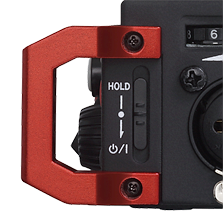
The HOLD switch makes it possible to disable unintended operation in order to prevent misoperation of the controls on the front panel, starting with the 4 gain adjustment knobs. Another example of the various design features for preventing misoperation are the handles on the left and right sides that protect the control surface while also enabling attachment of a shoulder strap. In addition, the gain adjustment knobs are designed so they are not moved with a slight touch, making unintended moves less likely. Other details implemented for ease-of-use include an LCD screen and LEDs that promote high visibility even under direct sunlight.
Use it as a standalone field recorder
The DR-701D can be used as a six-channel field recorder with four input channels. Attach a strap to the red handles for comfortable outdoor use. Whether hung around the neck or shoulder, the unit can be easily operated and adjusted.
Magnesium alloy for a lightweight, solid design
The unit is composed of a magnesium alloy that is very durable for a lightweight, but solid structure. While including abundant input connections, it was also designed for high mobility even when a camera support system or stabilizer is attached. Screw threads for mounting a tripod are included on the bottom of the unit, while a camera attachment screw and hot shoe (that can be removed) are included on the top of the unit. The DR-701D can be set up in a manner for the best handling. For example, it can be installed between a tripod and a camera, or attached to the top of the camera using a shoe mount.
Power can be supplied from a USB mobile battery
In addition to operation using 4 AA batteries, even longer operation is possible with support for power supplied from a mobile battery with a Mini-B USB port. The TASCAM BP-6AA battery pack is also compatible.
Camera compatibility chart
| Maker | Model | HDMI Clock Sync |
Start/Stop Trigger |
HDMI Timecode |
Notes |
|---|---|---|---|---|---|
| Canon | EOS 5D Mark III | OK | OK | OK | |
| EOS 7D Mark II | OK | OK | OK | ||
| EOS C100 | OK | OK | OK | ||
| GoPro | HERO4 | OK | — | — | |
| HERO3+ | OK | — | — | ||
| JVC | GY-LS300 | OK | OK | OK | |
| Nikon | D5 | OK | — | — | |
| D500 | OK | — | — | ||
| D4S | OK | OK | — | Firmware C:Ver.1.30 or later |
|
| D810 | OK | OK | — | Firmware C:Ver.1.10 or later |
|
| D750 | OK | OK | — | Firmware C:Ver.1.10 or later |
|
| Panasonic | DMC-GH4 | OK | OK | OK | BODY Firmware Ver.2.5 or later |
| HC-X1000 | OK | — | OK | ||
| Sony | PXW-FS5 | OK | OK | OK | |
| NEX-FS700 | OK | OK | OK | ||
| NEX-FS100 | OK | — | OK | ||
| α7S II | OK | OK | OK | ||
| α7R II | OK | OK | OK | ||
| α7S | OK | OK | OK | ||
| α7 II | OK | OK | OK | ||
| DSC-RX10M2 | OK | OK | OK |
Features at a glance:
- Compact, professional-grade audio recorder designed to be used in combination with a DSLR camera (also usable as a standalone field recorder)
- Uses an SD/SDHC/SDXC card as recording medium
- Recording at 44.1/48/96/192 kHz, 16/24-bit, WAV/BWF format (192 kHz only for two-channel recording)
- High-quality recording inputs through Tascam original High Definition Discrete Architecture (HDDA) microphone preamps
- Up to six recording channels (4 channels + stereo mix)
- Dual recording function allows two files to be recorded simultaneously at different levels (–1 dB to –12 dB)
- Recording levels can be adjusted independently for inputs 1–4
- Two built-in omnidirectional microphones
- Four XLR/TRS combo inputs support +4 dBu line level and phantom power (+24V/+48V)
- +24 dBu maximum input level (20 dB headroom)
- 64 dB gain (maximum)
- Additional unbalanced input for channels 1 and 2 (stereo mini jack) supports mics that require plug-in power, allowing the input of video mics and other high-output mics
- Selectable mid-side decoding for use with MS microphone setups
- Selectable delay to eliminate time lags caused by differences in the distances of two microphones (±150 ms)
- Five-stage switchable low-cut filter conveniently reduces unwanted low frequencies (40/80/120/180/220 Hz)
- Multiband limiter automatically adjusts input overloads (stereo-linking possible with inputs 1 and 2)
- Trim settings of input channels 1–4 can be displayed
- Built-in mixer enables pan and level adjustments as well as solo monitoring and can output a mix of four channels
- Trim controls can be grouped to allow the levels of multiple channels to be controlled simultaneously
- Audio mixed by the DR-701D can be output to a DSLR camera
- Camera input enables convenient monitoring of audio from a DSLR camera
- Clock and starting/stopping recording can be synchronized with a camera using the HDMI input (depending on type of camera)
- The recorder’s audio signal can be sent to an external recorder using the HDMI output
- Timecode can be input through the TC IN connector and recording start times added to files
- Built-in timecode generator (RTC) allows recording start times to be added to files even when there is no timecode input
- Slate tones can be added automatically or manually to simplify synchronization of video files when editing
- Mark function allows up to 99 points to be added to a single file (mark information can be used in software that supports BWF)
- A new file can be created during recording (manually or by file size)
- File name format can be set to use a user-defined word or the date
- Resume function remembers the playback position even when the unit is turned off
- Cascade function using HDMI connections allows DR-701D transport and monitoring operations
- Tone generator is convenient when adjusting the relative levels of different equipment
- Headphones jack with 2 × 50 mW maximum output
- High-quality audio output through a line output jack separate from the headphones jack
- Hold switch prevents misoperation
- Transport and SLATE buttons made of rubber to suppress noise during operation
- 128 x 64 pixel LC display with backlight
- LED lights are visible even in direct sunlight
- USB 2.0 port for high-speed transfer of files to computers
- Micro-B type USB cable included
- Stand adapter (¼ inch) on bottom side to attach the unit to a tripod
- DSLR bracket for easy camera attachment and removal
- Hot shoe mount (accessible when not using the DSLR bracket)
- Handles on the front left and right sides protect the screen and can be used to attach a shoulder strap
- RC-3F foot switch and RC-10 wired remote control can be connected (both sold separately)
- Operates on four AA batteries or rechargeables, USB bus power, optional AC adapter (Tascam PS-P520E), or optional external battery pack (Tascam BP-6AA)
- Additional features with firmware version 2.0
- Recording in Ambisonics A or B format
- Stereo mix of B format for input monitoring and playback through headphones output and line output
- Supports AmbiX and Furse-Malham (FuMa) exchange formats for B-format recording
- Selectable mic positioning allows flexible setup of the Ambisonics microphone (upright, upside down, end-fire)
Specifications
| General | ||
|---|---|---|
| Recording media | SD card (64 MB − 2 GB) SDHC card (4–32 GB) SDXC card (48–128 GB) |
|
| Recording and playback formats | WAV: 44.1 kHz, 48 kHz, 96 kHz, 192 kHz, 16/24 bit BWF: 44.1 kHz, 48 kHz, 96 kHz, 192 kHz, 16/24 bit |
|
| Number of input channels | 4 maximum (44.1/48/96 kHz) 2 maximum (192 kHz) |
|
| Number of recording channels | 6 maximum (44.1/48/96 kHz) 2 maximum (192 kHz) |
|
| Analogue audio inputs and outputs | ||
|---|---|---|
| IN 1–4 combo jacks | XLR-3-31 (1: GND, 2: HOT, 3: COLD) (XLR jacks can provide phantom power) 6.3-mm standard TRS jacks (Tip = HOT, Ring = COLD, Sleeve = GND) |
|
| Input gain set to LOW, MID, HI or HI+ | ||
| Input impedance | 2 kΩ | |
| Phantom Power | 48 V ±4 V (10 mA/channel) or 24 V ±4 V (10 mA/channel) |
|
| Maximum input level | +4 dBu | |
| Minimum input level | –72 dBu | |
| Mic input gain (input level knob at maximum) | LOW: +20 dB MID: +40 dB HI: +52 dB HI+: +64 dB |
|
| Input gain set to LINE | ||
| Input impedance | 10 kΩ or higher | |
| Nominal input level | +4 dBu | |
| Maximum input level | +24 dBu | |
| Additional input (EXT IN 1/2) | 3.5-mm stereo mini jack (can provide plug-in power) | |
| Input impedance | 10 kΩ | |
| Maximum input level | +10 dBV | |
| Minimum input level | −50 dBV | |
| Mic input gain (input level knob at maximum) | LOW: +3 dB MID: +11 dB HI: +26 dB HI+: +38 dB |
|
| Camera input | 3.5-mm stereo mini jack | |
| Input impedance | 10 kΩ | |
| Nominal input level | –10 dBV | |
| Maximum input level | +6 dBV | |
| Headphones output (PHONES) | 3.5-mm stereo mini jack | |
| Maximum output power | 50 mW + 50 mW | |
| Camera output | 3.5-mm stereo mini jack | |
| Output impedance | 200 Ω | |
| Nominal output level | –44 dBV | |
| Maximum output level | +6 dBV | |
| Notes: The maximum input level is the level that the input knob can be adjusted and a digital full-scale (0 dBFS) signal can be input without distorting. The minimum input level is the level that the input knob can be adjusted and a −20 dBFS signal can be input. | ||
| Line output (LINE OUT) | 3.5-mm stereo mini jack | |
| Output impedance | 200 Ω | |
| Nominal output level | –14 dBV | |
| Maximum output level | +6 dBV | |
| Other inputs and outputs | ||
|---|---|---|
| HDMI input/output (HDMI IN/OUT) | Type-A receptacle | |
| USB connector | Micro-B connector | |
| Format | USB 2.0 High Speed, mass storage class | |
| Timecode input (TIME CODE IN) | BNC | |
| Input signal voltage range | 0.5–5 Vpp | |
| Input impedance | 10 kΩ | |
| Format | SMPTE 12M-1999 compliant | |
| REMOTE connector | 2.5-mm TRS micro jack | |
| Audio performance | ||
|---|---|---|
| Frequency response | 20 Hz – 20 kHz +0.5/−1 dB (LINE IN to LINE OUT, Fs 48 kHz, JEITA) 20 Hz – 40 kHz +0.5/−1 dB (LINE IN to LINE OUT, Fs 96 kHz, JEITA) 20 Hz – 80 kHz +0.5/−5 dB (LINE IN to LINE OUT, Fs 192 kHz, JEITA) |
|
| Distortion | 0.007 % or less (Mic input to LINE OUT, −10 dBu input, Fs 44.1/48/96/192 kHz, JEITA) |
|
| S/N ratio | 100 dB or more (Line or Mic input to LINE OUT, Fs 44.1/48/96/192 kHz, JEITA) |
|
| Equivalent input noise (EIN) | −124 dBu or less | |
| Power supply and other specifications | ||
|---|---|---|
| Power supply | 4 AA batteries (alkaline, NiMH or lithium) AC adapter (Tascam PS-P515U, sold separately) or USB connection External battery pack (Tascam BP-6AA, sold separately) |
|
| Power consumption | 6.5 W (maximum) | |
| Current consumption (USB connection) | 1.3 A (maximum) | |
| Dimensions (W × H × D) | 169 mm × 57 mm × 114 mm (with camera adapter attached) | |
| Weight | 654 g (including batteries) 561 g (excluding batteries) |
|
| Permissible operating temperature range | 0–40 °C | |
Design and specifications subject to change without notice.
| Titel | Type | Størrelse | Download |
|---|---|---|---|
| DR-701D_OM_multi_RevB.pdf | 11.22MB | Download |

